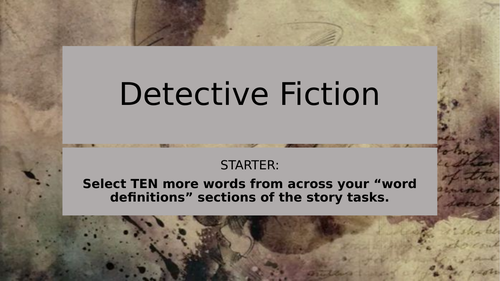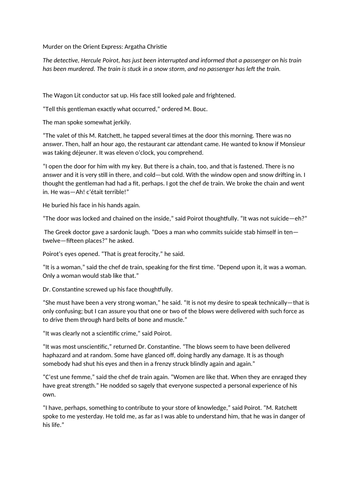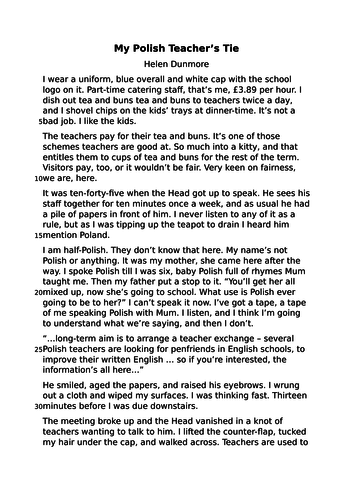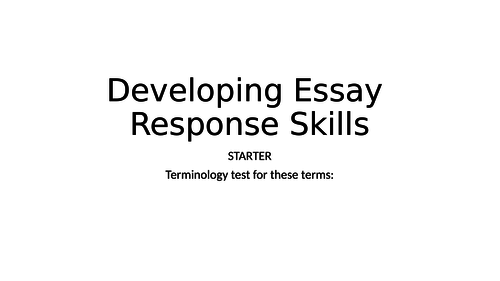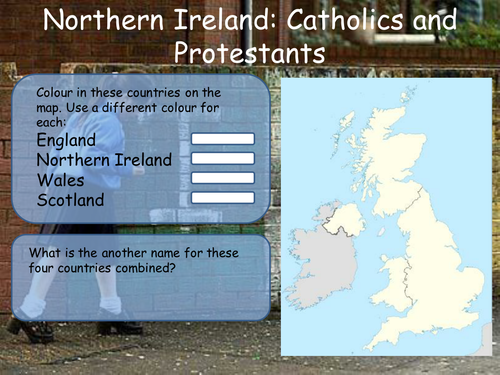
228Uploads
560k+Views
1393k+Downloads
All resources

KS3: Survival Reading Assessment
A series of lessons and resources designed for a top set year 8 class. The extracts are a mixture of fiction and non-fiction. The focus was to take a group of year 8 students who are used to using the PEE structure and get them to write a concept focused response. I’ve included the model responses we built as a class, as well as the model response the students were provided.

Debate Boxing
This is quite possibly, the coolest thing I've ever tried out. The premise is as follows: a debate between two students (or teams) where four referees observe. The referees score what they see and a winner is announced at the end.
Now add in entrance music a la pro-wrestlers (think the Rocky Theme, We Will Rock You etc.) and run it on an open evening and I promise you this - you will have EVERY parent in at some point to see what is going on.
I've run this at SIX parents evenings now and the same thing happens every time - all of the kids rock up to watch. I set it last time round where the Deputy Head took on the winner of the students (a year 9 girl). They packed the place out to see who won . The debate topic "Batman vs Superman" (serious stuff this). Needless to say, she wiped the floor with him (in a totally professional way).
You'll need to be the promoter/commentator/ring side referee - this can be exhilarating and exhausting!
Try it.

KS3: Born a Crime - Structure Focus
A lesson take from a collaborative scheme of work. The lesson focuses on the quite excellent Born A Crime by Trevor Noah. The focus is developing an initial understanding of South Africa, then Trevor Noah himself, before focusing in on the context surrounding the story itself.
After, the focus switches to analysing the structural choices made in the extract.
Additionally, I’ve included a useful little follow up lesson where the focus ins to build a piece of creative writing that follows a specific structural path.

KS3: As You Like It - GCSE Focused SoW
To make effective use of this scheme I suggest you have a copy of the most recent RSC version of As You Like It (It is quite marvelous…) else a lot of the images I use will make little sense.
There are five “lessons” that each last around the two hour mark. Each of the assessments is available, so the whole package is a self-contained unit of work. We had a lot of fun with this unit, and I inter-spaced the learning with periods where the class would act out elements of the play.
You don’t necessarily need a copy of the play to teach this unit either.

AQA English Language Paper 2 Revision Pack (London 2012 vs The Great Exhibition)
Two powerpoints (both alike in dignity…); the larger of the two covers the deconstruction of an English Language Paper 2 Section A mock exam - we go through common mistakes, areas of concern and identify how to improve on what we’ve done. I’ve provided the sources too, so you could use this as the basis of a Section A walking-talking mock; the smaller powerpoint covers speech writing, an area my lot particularly struggled with.
Happy hunting…

KS3: Exploring the theme of "Journeys" - A Sound of Thunder (Reading SoW)
I had a lot of fun with a bottom set, boy heavy year 9 group with this. They took to the story well and did OK with their reading assessment.
Enjoy and let me know how it goes.
Bundle

AQA English Literature Paper 1 Bundle
Jekyll & Hyde, A Christmas Carol and Romeo & Juliet resources PLUS a spreadsheet to track them all.

Spell Quest - making spelling fun
A summer spent playing word games with my kids lead me to this idea.
The idea is that the students are supplied with a grid of letters. They use these letters to build words which cause damage to a cartoon monster. The bigger the word, the more damage done to the monster.
I’ve made it more and more difficult as the monsters develop - you have to use certain letter types for example.
I plan to give each child one grid per week to complete and have their peers mark it.
So you are completely aware, I have left all of the grids blank apart from on a few. You will need to fill these in yourself. Also, I have left the challenge component blank too. This will allow you to create challenges that reflect the specific types of spellings you are looking at - double damage awarded for homophones for example.
There’s massive scope for differentiation in here too. I’ve included a whole class version of the spelling levels, as well as a photocopy friendly version too.
I have long believed that making school a little more like computer games can be helpful - this is my first attempt at exploring Gamer Theory as I have dubbed it.
Watch this space for more. Have to figure out how to do something similar with the other components of SPAG and Reading now…
ADDITION: I’ve included some completed versions of the pack to give you an idea of what they could look like. Pay attention to the NOTES section of the power points too. These grids have been designed to be used in tandem with the Escape From Kraznir scheme of work.
ADDITION: I’ve also added a new powerpoint that works as a whole class exercise. You don’t need the sheets, just paper and the will to go on…

AQA A-Level English Language and Literature - Introduction to Poetry (Heaney)
My introduction unit for A-Level Language and Literature. It assumes that the academic voices of the students needs sharpening somewhat. I source a lot of stuff from various corners of the net and use it in the power points - pay particular attention to the notes element of the power points by the way. I also include a “model essay” the purpose of which is to get the students to move away from their formulaic essay structures that they have used in their GCSEs.
Think of this as a starting point that may need a little shaping to suit the needs of your class.
Bundle

AQA GCSE Curriculum
Every scheme of work that I’ve made that could be used to teach AQA English Language and AQA English Literature

KS3: Detective Fiction - Sherlock Holmes. Workbook included. Reading and Writing SoW.
A thoroughly enjoyable unit of work. Built around a work booklet and designed for that awkward half-term at the end of the year where you don’t want to give out new exercise books.
The workbook contains a copy of The Norwood Builder, comprehension questions and vocabulary list, as well as a variety of activities that focus (primarily) upon creative writing skills with some language and structure based tasks.
The lessons are designed to be used with the workbook.
NOTE: I may upload a slightly different workbook in the future, but I will leave the original on here.

KS3: Murder on The Orient Express Language Task - Method Focus
Using a format that proved successful in the KS4 arena, I’ve adapted the thinking to apply to an AQA English Language P1 Q2/P2 Q3 style task that would fit for a higher ability top set KS3 class.
The approach is to initially read the extract then to specifically identify concepts that relate to a language focused task, followed be explicitly identifying language based methods and incorporating into a response.

AQA English Language Paper 1 Section A Mock Exam - My Polish Teacher's Tie
I've found another use for all that knowledge we have about the old AQA English Lit anthology (The Sunlight on The Grass anthology). I have started to turn them into English Language Paper 1 Section A Mock Exams!
This is one of them. There is no mark scheme, but if you use the Paper 1 mark scheme from the AQA website you should be fine.
This one uses the opening of My Polish Teacher's Tie.
Bundle

Jekyll and Hyde Bundle
A Jekyll and Hyde scheme of work (designed to be taught over a whole term) and a revision unit (desgined to betaught over a few weeks). Also, I include a spreadsheet that allows you to track the scores of your students.

AQA English Language and Literature: Developing essay response skills to the Paris Anthology section
This is my attempt to engage and develop my Year 12s academic voices in their Paris Anthology related essay responses. The main issue my class had seemed to focus upon when and where to start. What I do is show them how they can place a particular emphasis on one of several potential areas of focus initially. I show them how they could use Mode, Audience, Purpose, each of Grice’s Maxims and each of the different levels of language as a starting point for an analytical response. The attached word document appears to be an “essay”.It isn’t. It’s the collected starting points placed in one document so that the students can focus more on the “how you do it” instead of trying to copy down the best bits.
It worked reasonably well and is suited for a class with similar needs. Hope you find this useful.

Northern Ireland Conflict
Dyslexic friendly resource aimed at EBD children. An initial foray into the problems occurring in Northern Ireland.

AQA English Literature: Romeo and Juliet Revision Lessons
I pulled together a lot of thinking from a lot of different websites and have shaped it into these lessons. Not all of the content is mine.

D6 Dungeons and Dragons: Creative Writing tool kit - let your students' imagination run wild!
I am vexed (greatly vexed) at the generally poor quality of creative writing with students these days - they do tend to have a lot of their thinking done for them. Sadly, it seems to be something that is leeched out of them by a combination of an aggressive curriculum and teenage priorities. So, this is my answer - DUNGEONS and DRAGONS (Or D6 Dungeons and Dragons as I am now calling it).
Simply put, it's a very simplified version of the original Dungeon's and Dragons - you need only a D6 (One dice), pens, paper and this power point to play.
Try it out - I had some huge success with year 8, 9 and 11 classes instead of playing DVDs in the build up to the Christmas Break - it would work just as well for Easter, Summer and stand alone lessons where you have an awkward space to fill.
Use this lesson when you are trying to answer this question - how can I teach kids to be more creative?
There is some initial effort required on your part though - you will have to be the Dungeon Master in the example - but once you've got past this part, I am willing to bet you could leave the room and the kids won't have noticed.
Additionally, I will be creating a series of themed "mission packs" for Christmas, Easter and Summer - you'll have to buy these (they take a while to make), but the start point is yours for free!!!
LINK to Christmas Mission Pack - THE CASTLE OF TERROR!
https://www.tes.com/teaching-resource/d6-dungeons-and-dragons-christmas-mission-pack-the-castle-of-terror-11462671













